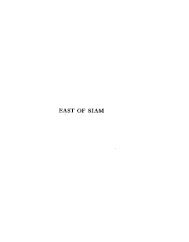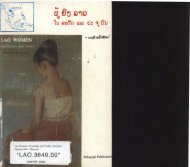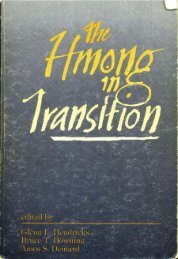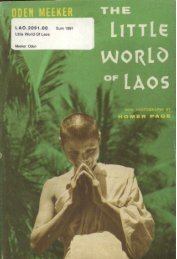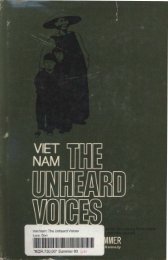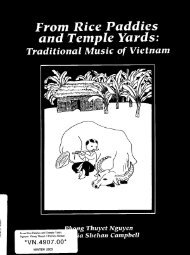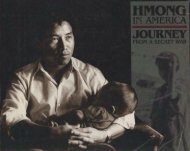PEOPLE
Grant, The Boat People - Refugee Educators' Network
Grant, The Boat People - Refugee Educators' Network
- No tags were found...
Create successful ePaper yourself
Turn your PDF publications into a flip-book with our unique Google optimized e-Paper software.
life under communism, may help to enlarge the outflow and i-<br />
'<br />
the problem. Some ASEAN governments may have had this in mind<br />
,'<br />
when they set out to hunt their inhumanity, hoping that word<br />
would get back that their reocptivencss could not be takcn for '<br />
pnted. However, when the main bsuts brought to a head by the 'f,<br />
,<br />
story of the boat people are considered, tit room for decision in :,<br />
influencing the 'pull' facton appean sleverely limited, i, ,<br />
Thc fint of these issues ie stability. The link between the flaw<br />
of refugees from Indo-China and the inrstnbility of the region ia ':-<br />
dear. The muse of this instability is also elmi, although there o r I::%<br />
several layers: it is thc conflict between Vietnam and China. If thir . : ;<br />
conflict continues, as it shows every likelihood of doing, the result .: ]<br />
will be more destruction in Kampuchea, and possibly Laos, anxitty :,, ' ,<br />
in the ASRAN states, especially Thailand, and increasing military sup- '<br />
port by the USSR<br />
i<br />
for Vietnam. So when it is sometimes ~uggestad .:,<br />
that the flow of refugemi mn only be stopped at the souw, namely .:<br />
Vietnam, the aaaenion is only hdf rmr, unleu it is mum to sugee~t I::,<br />
that Vietnam ia responsible for its conflict with China and should j!<br />
rewlvc it single-handed. The evidence, rather, is thmt the rtsponsi- :I I<br />
bility is shared nnd, in prtifular, that each hrs<br />
respon~ibility for :::<br />
the flight of the ethnic Chinese from Vietnam.<br />
The prospect of reconciling Hanoi and Rking is depressingly ji<br />
slight. The intensity of their history, their rivalry in Kampucha, 'ti<br />
China's deep suspicion of the Soviet Union and the reluctance of 1':<br />
the United States to normalize relations with Hanoi make a sharpen- ',I'<br />
ing of the contlia a more likely prospect. It is just possible, however,<br />
that the rtfugees, by embarrassing everyone, have caused second<br />
thoughts about what appesred to be - at the height of the aisis in<br />
mid-1979 - a concerted policy on the part of the United Stam, its<br />
allies, the MEAN wtcs and China to isolate Vietnam. The ASEAN<br />
states in prticular, being on the scene and touchy (some of them)<br />
about Chim's role in their region, might discover that their intemD 'I<br />
lie in trying to reassure Vitmam, although how, in the prcwnt dire<br />
circumstances of the show-down in Kampuchea, this can be don&<br />
is nm easily evident. There is an urgent need d statesmanship for,,<br />
South-East Asia, Wht we witness instead is a merciless kind of '<br />
statmaft that is bth calloua and precarious.<br />
Can nothing be done? One possibility thpt has not been explored<br />
I<br />
.!. . 1<br />
is for a conference, on the lines of the Geneva conference of 1954,<br />
with Kampuchea as the main item on the agendn. Kampucha<br />
appcattd, in late 1979, to be almmt at last gasp. Apart from terrible<br />
human suffering, civil administration had almost disappeared; thm<br />
was a real pro~pect that the nation-state itself would be destroyed,<br />
or just di~ppc~. While Vietnam and China art each intent on cre-<br />
ating a government in Phnom Fknh that is ttspnsive to thcm, other<br />
smtes in the region and, for that matter, in the world, would more<br />
likely be happy with a dtlibtrattly neuml Kampuchea. Why should<br />
nor a neutral Kampuchea also a ppl to the two superpowen, the<br />
USSR and the US?<br />
If the Soviet Union's mlculation is that it an back Vietnam successfully<br />
in the war with China, as it did in Viemam's war with the<br />
United States, it may be mistaken. While it is abundantly me that<br />
Vietnam is a defiant nstion and is unlikely tu apitulate to China,<br />
it is also me that China is a more difficult advemry than the United<br />
Ststa - it is neat at hand, patient and has the means (one of thcm<br />
being the Chinese inside Vianam) to keep Hanoi on the boil. Also,<br />
it is hard to see what interest the Swiet Union has in a pro-<br />
Vietnamw rtgime in Phnom Penh, txccpt to deny China. If Hanoi<br />
is successful in Kampuchra, the border with Thailand will harden,<br />
creating tensions within ASEAN. As a global power, with an intemt<br />
in moving its ships through the straits of South-East Asia (all of<br />
them controllable by Indonesia, with assistance from Malaysia and<br />
Singapore), the USSR need8 good relations with the MEAN state.<br />
It is obvious that some cushioning is needed between Vicmam and<br />
Thailand: thc answer could be to take Kampuchea out of the hands<br />
of bath or either Peking or Hanoi. Another podbility, of course,<br />
is that Thailand could become passive, assuming its historial buffer<br />
role, not now beween France and Britain but W een a Vietnamese<br />
Indo-China and a non-communist South-East Asia. But while this<br />
could happen, it would only be after much more blood has been shed<br />
- after, indeed, Vimarn has won out in Kampuchea. The case for<br />
a neuml Kampuchea is much more striking on humanitarian<br />
grounds, indeed on every ground, In a sense that is almost literal,<br />
it is I ax for the preservation of an endangered spies.<br />
Hanoi might find some unpleasant resonances in the revival of the<br />
1954 Geneva confmnce, which kame for it m in~arment of<br />
1 98






